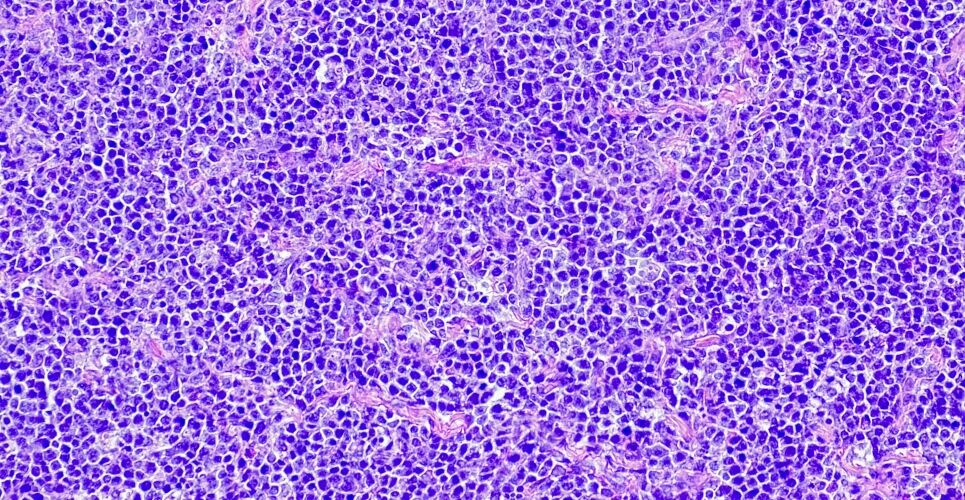The injectable bispecific antibody epcoritamab (brand name Tepkinly) has been granted conditional marketing authorisation by the Medicines and Healthcare products Regulatory Agency (MHRA), its manufacturer Abbvie has announced.
This follows its conditional marketing authorisation by the European Commission in late September 2023.
The conditional marketing authorisations recommend epcoritamab as a monotherapy for adult patients with relapsed or refractory (R/R) diffuse large B-cell lymphoma (DLBCL) after two or more systemic therapies.
Epcoritamab is the first and only off-the-shelf, subcutaneously administered CD3xCD20 T-cell-engaging bispecific antibody. It is designed to simultaneously bind to both the cluster of differentiation (CD)3 proteins on immune T cells and the CD20 proteins on cancerous B cells and activate the T cell to destroy the B cell.
Unlike existing therapeutic options for DLBCL, epcoritamab does not require cell collection and engineering before eligible patients can start treatment and it can be delivered in broader settings. It therefore has the potential for greater geographical accessibility and more timely administration.
Professor Chris Fox, professor of haematology at the University of Nottingham’s School of Medicine, and honorary consultant haematologist at Nottingham University Hospitals NHS Trust, UK, said: ‘Despite recent therapeutic advances, treatment options for patients with R/R DLBCL after two previous therapies are limited. For such patients living with this type of aggressive blood cancer, many experience disease progression and have poor prognosis.
‘As a novel bispecific antibody, given as a subcutaneous injection, epcoritamab offers a new treatment option for this difficult-to-treat patient group.’
Anna Sureda, head of clinical hematology department, Institut Català d’Oncologia – L’Hospitalet in Barcelona, Spain, said: ‘R/R DLBCL is an aggressive cancer and patients can face a difficult and emotional treatment journey. At this point in the journey, a patient may have had multiple lines of therapy and will already have experienced relapse.
‘This European Commission approval represents an important moment for the DLBCL patient community and brings with it a potential opportunity for effective disease management for a condition with limited available treatment options.’
Epcoritamab‘s EPCORE trial results
The conditional marketing authorisations are based on the results of the single-arm Phase 1/2 EPCORE NHL-1 trial, which investigated epcoritamab as monotherapy for 139 patients with R/R DLBCL after two or more lines of systemic therapy.
Phase 1 of the study looked at dose escalation, which determined the recommended phase 2 dose, and the phase 2 expansion treated additional patients to explore safety and efficacy. The primary endpoint was overall response rate determined by the 2014 Lugano criteria as assessed by an independent review committee.
Secondary endpoints included duration of response, complete response rate, progression-free survival, overall survival, time to response, time to next therapy and rate of minimal residual disease negativity.
Patients achieved an overall response rate of 61.9% (n=86/139) and a complete response rate of 39.6% (n=54/139).
The researchers also found that epcoritamab prevented the growth or spread of the cancer for an average of 15.6 months, and the patients lived for an average of 19.4 months from the start of epcoritamab therapy.
The trial results demonstrated a manageable safety profile, with cytokine release syndrome being the most common serious adverse event (31.1%), followed by pneumonia (7.2%), upper respiratory tract infections (2.4%), febrile neutropenia, immune effector cell-associated neurotoxicity syndrome (ICANS) (2.4%) and pyrexia (2.4%).
Four patients (2.4%) experienced a fatal adverse reaction – ICANS in one patient (0.6%) and pneumonia in three patients (1.8%).
Further data from the trial are expected in due course.
‘An important step forward’
Commenting on the MHRA conditional marketing authorisation, Belinda Byrne, medical director at AbbVie UK, said: ‘AbbVie is committed to advancing care for people living with blood cancer. Today’s news is an important step forward in enabling us to provide this hard-to-treat patient group with an innovative subcutaneous treatment.
‘We are working with the NHS and relevant authorities to bring access to eligible patients and clinicians throughout the UK as quickly as possible.’
Epcoritamab is delivered to eligible patients by clinicians as a weekly subcutaneous injection for 12 weeks, then moves to every other week for 24 weeks (12 injections), before continuing as one injection every four weeks until treatment is discontinued due to cancer progression or side effects.
Epcoritamab is the first injectable bispecific antibody to be approved for use in DLBCL. It follows the recent MHRA approval and National Institute for Health and Care Excellence recommendation of glofitamab (brand name Columvi), a bispecific antibody administered via infusion.
Glofitamab also gained conditional marketing authorisation in the EU in July 2023.

